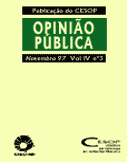Resumen
Este artigo analisa as estratégias de persuasão eleitoral utilizadas nas campanhas para as prefeituras do Rio de Janeiro e de São Paulo em 1996.
Abstract
This article analyses the strategies of electoral persuasion used in the campaigns for the Mayors of Rio de Janeiro and São Paulo in 1996.
Keywords: electoral campaign, communication strategies, political advertising.
Citas
ALBUQUERQUE, A. Política versus televisão: o horário gratuito na campanha presidencial de 1994. Comunicação e política, v. 1, n. 3 (nova série), abril/julho 1995.
ALBUQUERQUE, A. A batalha pela presidência: o horário gratuito de propaganda eleitoral na campanha de 1989. Tese de Doutorado, Escola de Comunicação, UFRJ, Rio de Janeiro, 1996.
ALONSO, A. M. Opinión Pública y Comunicación Politica. Ediciones de la Universidad Complutense - EUDEMA, España, 1992.
ATKIN, C. K. et al. Quality versus quantity in televised political ads. Public Opinion Quarterly, v. 40, 1973.
BARRY, B. Political argument. London: The Humanities Press, 1965.
BERELSON, B. R.; LAZARSFELD, P. F.; McPHEE, W. N. Voting: a study of opinion formation in a presidential campaign. The University of Chicago Press, 1954.
BRADLEY, R.; SWARTZ, N. Possible worlds: an introduction to logic and its philosophy. Basil Blackwell, 1979.
BUTLER, D.; RANNEY, A. Electioneering: a comparative study of continuity and change. Oxford: Clarendon Press, 1992.
CAIN, B.; FEREJOHN, J.; FIORINA, M. The personal vote: constituency service and electoral independence. Harvard University Press, 1987.
COHEN, J.; DAVIS, R. G. Third person effects and the differential impact in negative political advertising. Journalism Quarterly, v. 68, n. 4, 1991.
DIAMOND, E.; BATES, S. The spot: the rise of political advertising in television. Cambridge, Mass.: MIT Press, 1988.
DIAS, H. Mídia e política: a cobertura de O Globo e a eleição municipal no Rio de Janeiro em 1992. Dissertação de Mestrado, IUPERJ, Rio de Janeiro, 1995.
DOWNS, A. An economic theory of democracy. New York: Harper & Row, 1957.
EDELMAN, M. The simbolic uses of politics. Chicago: University of Illinois Press, 1977.
GLASS, D. P. Evaluating presidential candidates: who focuses on their personal attributes?. Public Opinion Quarterly, v. 49, n. 4, 1985.
GOMES, W. Theatrum politicum: a encenação política na sociedade dos mass media. In: BRAGA, J. L.; PORTO, S. D.; FAUSTO NETO, A. (org.). A encenação dos sentidos: mídia, cultura e política. Rio de Janeiro: Compós/Diadorim, 1995.
GRABER, D. Political comunication: scope, progress, promise. In: FINIFTER, A. W. (org.). Political science: the state of the discipline II. American Political Science Association, 1993.
HOLBROOK, T. M. Do campaigns matter? Thousand Oaks: Sage, 1996.
JAMIESON, K. H. Dirty politics: deception, distraction and democracy. New York: Oxford University Press, 1993.
JORGE, V. L. A eleição presidencial de 1994 e os meios de comunicação de massa. Uma análise da propaganda eleitoral gratuita de Fernando Henrique Cardoso e Luiz Inácio Lula da Silva na televisão. Dissertação de Mestrado, lUPERJ, Rio de Janeiro, 1995.
JORGE, V. L. Os meios de comunicação de massa nas campanhas eleitorais. Comunicação & Política, v. IV, n. 1, janeiro-abril 1997.
JUST, M.; CRIGLER, A.; WALLACH, L. Thirty seconds or thirty minutes: what viewers learn from spot advertisements and candidate debates. The Journal of Communication, v. 40, n. 3, 1990.
KAID, L. L.; HOLTZ-BACHA, C. (org.). Political advertising in western democracies: parties & candidates on television. Thousand Oaks: Sage, 1995.
KAID, L. L.; JOHNSTON, A. Negative and positive television advertising in U.S. presidential campaigns, 1960-1980. Journal of Communication, v. 41, n. 3, 1991.
KERN, M. 3O-Second politics: political advertising in the eighties. New York: Praeger, 1989.
KRIPPENDORFF, K. Content analysis: an introduction to its methodology. Thousend Oaks: Sage, 1980.
LAWSSEL, H. D. Language of politics: studies in quantitative semantics. Stanford: Stanford University Press, 1965.
MANIN, B. As metamorfoses do governo representativo. Revista Brasileira de Ciências Sociais, v. 10, n. 29, outubro 1995.
POPKIN, S. L. The reasoning voter: communication and persuasion in presidential campaigns. Chicago: Chicago University Press, 1994.
PORTO, M. As eleições municipais em São Paulo. In: MATOS, H. (org.). Mídia, eleições e democracia. Editora Página Aberta, Scritta, 1994.
REES, L. Vende-se política. Rio de Janeiro: Editora Revan, 1995.
RIKER, W. H. The strategy of rhetoric. Yale University Press, 1996.
RONEN, R. Possible worlds in literary theory. Cambridge University Press, 1994.
ROSEMBERG, S.; McCAFFERTY, P. The image and the vote: manipulating voter's preferences. Public Opinion Quarterly, v. 51, n. 1, 1987.
SEMETKO, H. A. et al. The formation of campaign agendas: a comparative analysis of party and media roles in recent american and british elections. New Jersey: Lawrence Erlbaum Associates,
SWANSON, D.; MANCINI, P. (ed.). Politics, media and modern democracy: an international study of innovations in electoral campaigning and their consequences. Westport: Praeger, 1996.
VEIGA, L. Propaganda eleitoral e voto. Dissertação de Mestrado, IUPERJ, Rio de Janeiro, 1996.
WATTENBERG, M. The rise of candidate-centered politics: presidential elections of the 1980s. Harvard University Press, 1991.
A Opinião Pública utiliza a licença do Creative Commons (CC), preservando assim, a integridade dos artigos em ambiente de acesso aberto.

